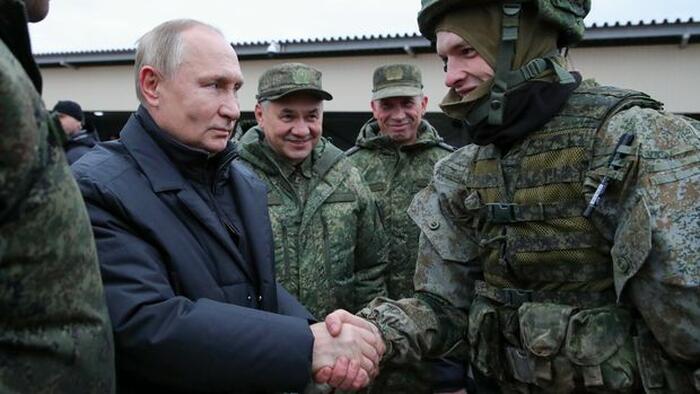In a fresh weekend report The New York Times says that President Vladimir Putin is ready to negotiate an end to the nearly two year-long ‘special operation’ in Ukraine, at a moment most of the territory which forms the four ‘annexed’ oblasts remains firmly under Russian military control.
However, to some degree, Putin has consistently held open the chance to negotiate… it’s just that “negotiate” in the Kremlin context would be on the basis of Crimea and the Donbass being fully recognized as Russian Federation territory. Until recently, the West considered this an impossibility, but US and European officials have more recently quietly admitted Moscow has more or less ‘won’. The NY Times quotes Putin in the following:
Buoyed by Ukraine’s failed counteroffensive and flagging Western support, Mr. Putin says that Russia’s war goals have not changed. Addressing his generals on Tuesday, he boasted that Ukraine was so beleaguered that Russia’s invading troops were doing “what we want.”
“We won’t give up what’s ours,” he pledged, adding dismissively, “If they want to negotiate, let them negotiate.” But in a recent push of back-channel diplomacy, Mr. Putin has been sending a different message: He is ready to make a deal.
The report cites Russian diplomatic sources who say Putin has for the first time been open to ceasefire which would include a freezing of all frontline fighting. American officials say the same, per the report: “In fact, Mr. Putin also sent out feelers for a cease-fire deal a year earlier, in the fall of 2022, according to American officials.”
“That quiet overture, not previously reported, came after Ukraine routed Russia’s army in the country’s northeast. Mr. Putin indicated that he was satisfied with Russia’s captured territory and ready for an armistice, they said.”
Very obviously, Ukraine’s leadership and society has been fracturing under the strain of the invasion and immense death toll, with Kiev officials recently admitting monumental problems with manpower and ammo supply.
But the reality is that Russian society is likely facing deep fractures and uncertainty too, though it’s far less evident. Countless mothers, fathers, and families are grieving and dealing with the loss of loved ones killed in action. Conservative estimates have said at least 50,000 Russian troops have died in the war (and that is based just on data as of mid-summer). US officials have claimed a figure in the hundreds of thousands, but there are reasons to be doubtful of this.
Angry families of fallen soldiers have increasingly formed the locus of a small but increasingly visible Russian anti-war movement, suggesting broader quiet societal angst concerning the direction of the war in Ukraine. They don’t want Ukraine to be Russia’s “endless war”. This discontent threatens to become much more out in the open, seen for example in the following:
Former TV journalist Yekaterina Duntsova was disqualified on Saturday from running against President Vladimir Putin in an election next March because of alleged flaws in her application to register as a candidate.
Video from a meeting of the central electoral commission showed members voting unanimously to reject the candidacy of Duntsova, who had wanted to run on a platform to end the war in Ukraine and release political prisoners.
Her disqualification was seized on by Putin’s critics as proof that no one with genuine opposition views will be allowed to stand against him in the first presidential election since the start of the 22-month war. They see it as a fake process with only one possible outcome.
According to more in the NYT report on Putin’s supposed new-found readiness for serious negotiations:
Mr. Putin’s repeated interest in a cease-fire is an example of how opportunism and improvisation have defined his approach to the war behind closed doors. Dozens of interviews with Russians who have long known him and with international officials with insight into the Kremlin’s inner workings show a leader maneuvering to reduce risks and keep his options open in a war that has lasted longer than he expected. While deploying fiery public rhetoric, Mr. Putin privately telegraphs a desire to declare victory and move on.
“They say, ‘We are ready to have negotiations on a cease-fire,’” said one senior international official who met with top Russian officials this fall. “They want to stay where they are on the battlefield.”
🇷🇺 Ambassador Ilya #Rogachev:
💬 All talks and negotiations on the basis of the infamous Zelensky ‘peace plan’ have no future, because #Russia will never accept an outcome of a negotiation process in which it does not participate.
👉 Watch full interview https://t.co/nQvH4MHh8F pic.twitter.com/6WFYGLsZ5T
— Russia in South Africa 🇷🇺 (@EmbassyofRussia) December 22, 2023
So likely, Putin could be facing increased pressure even from Kremlin senior officials to wrap up Ukraine operations, especially given the Donetsk, Luhansk, Kherson and Zaporizhia regions have already been declared part of Russia, and a firm military grip remains on them.
But it remains that Ukraine’s Zelensky has shut the door every time he’s so much as asked by the press about the possibility of negotiating. Simultaneously, he’s admitted time and again that things aren’t going well for Ukraine forces on the battlefield. Yet he still says he’ll never enter ceasefire talks with Moscow so long as Putin is still in power.
Loading…












